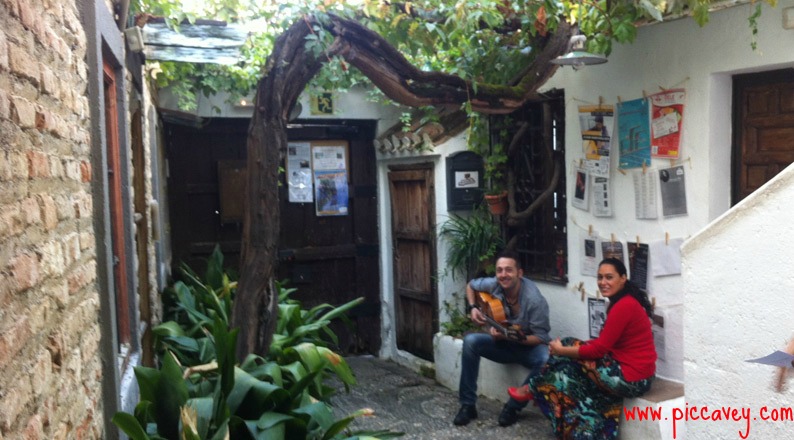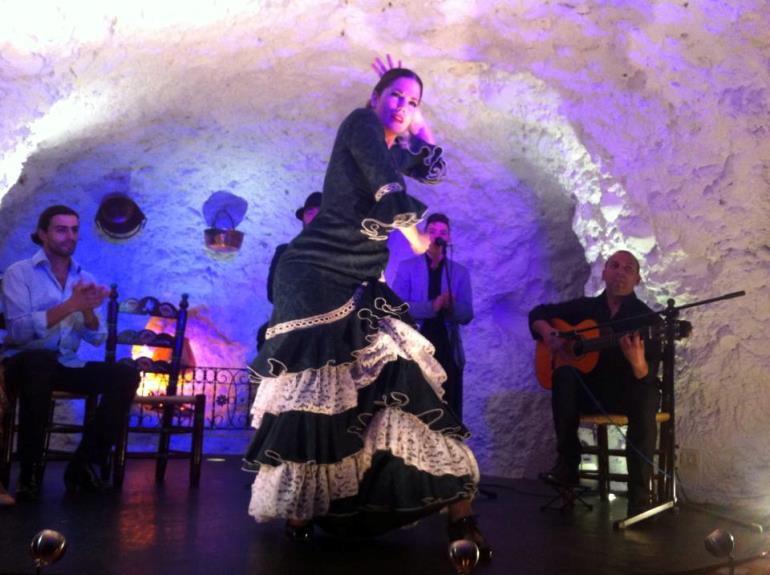Celebrating Gypsies of Granada
The City of Sorrows Novel
On October 30, 1996, the Andalusian Parliament declared that November 22 is to be celebrated as El Día de los Gitanos Andaluces, The Day of the Andalusian Gypsies. This day celebrates the arrival of the first group of Gypsies (gitanos) to Andalusia and their friendly reception by Don Miguel Lucas de Iranzo, Count of Jaén, in 1462.

Even though the first group of Gypsies arrived in Jaén, today 50,000 Roma call Granada home, many of them living in the distinctly Roma district of Sacromonte. The Gypsies of Granada have long been associated with a rich, flamenco tradition.
Sacromonte is a good place to see zambra, a flamenco variation with a more Oriental feel in which the singer also dances. Two popular and well-established zambra venues are Zambra Cueva del Rocío (Camino del Sacromonte 70) and María la Canastera (Camino del Sacromonte 89).
The Center for the Interpretation of Sacromonte is a kind of Roma open-air folk museum, offering an insight into Sacromonte’s geology and environment, cave building, and Roma crafts, food, and musical traditions (with English explanations). The center also features flamenco shows and classical guitar concerts in its wonderfully scenic setting on the main Sacromonte lane (Barranco de los Negros).
Beyond the tourist caves of Sacromonte, there is a wealth of professional talent coming from the Roma Gypsies of Granada. Estrella Morente is an accomplished flamenco singer from Las Gabias, daughter of singer Enrique Morente and dancer Aurora Carbonell.

Another famous performer from Granada is Antonio Carmona, who is considered one of the best representatives of “the new flamenco,” or “flamenco fusion.” Antonio comes from a long line of flamenco artists. He is the great grandson of guitarist “Habichuela el Viejo,” the son of guitarist Juan Habichuela, and the nephew of guitarist Pepe Habichuela.
Throughout the years, the Roma population in Andalusia has passed from favor to /systemic persecution, which has brought about a great loss in their culture and language.

The Gypsy influence in the poetry of García Lorca, in the music of Falla, in the paintings of Picasso, the flamenco of Camarón, all attest to the special contributions of the Gypsies to Andalusian culture. It is for the purpose of remembering this culture that the Andalusian Parlament has declared November 22 as the Day of the Andalusian Gypsy.

Flamenco in Andalusia
In honor of El Día de los Gitanos Andaluces, Susan Nadathur is offering her novel City of Sorrows—an epic story set in the enigmatic world of Gypsy Spain—at a special promotional price on the Kindle edition and a discounted printed edition from 16th to 22nd of November.
Additionally, Susan will donate one free copy via a contest on this blog.
To participate in this contest, leave a comment on this post answering the following question:
In twenty-five words or less, tell us why you think the Spanish Gypsy should be celebrated.
Both Susan and I are interested in hearing what you have to say about honoring this marginalized group. Contest ends on November 22, 2013.
The winner will be notified by email and shipped either the print or Kindle version of the book.
Susan Nadathur is a widely-traveled writer, teacher, and self-proclaimed “outsider” from Connecticut who lives on-and-off in Spain with an extended family of Gypsies in Seville.
City of Sorrows is her debut novel
************************************************************
Drum roll please!
The Winner of the Competition is Maxine Raynor.
Her comment was chosen out of the ones below.
Well done!
Hope you enjoy reading The City of Sorrows and discovering more about Gypsies in Granada and Flamenco culture





It is very interesting to read all of those nice comments about the Gypsies when there are a lot of people who detest them. But Spaniers must express our gratitude for their heritage.
The Spanish gypsies are woven inextricably into the rich fabric of Andalucia, with tantalising music, exhilarating dances and tasty recipes dating back centuries.
Andalucia wouldn’t be Andalucia without ‘gitanos’.
Gitanos are central to Andalucian culture. Without them, we’d be distinctly lacking in bewitching flamenco, humanitarian spirit and pretty things to look at in the street.
I love the article, we need more like this because I think, as is the case so often in this world, that people take the actions of the few and tar the many with the same brush which is very sad!
In my youth I visited many bars and fiestas in Andalucia. It was the haunting melodies and simply huge talent of the guitarists and dancers which filled my soul and has never left.
Without the “Spanish Gypsy”, neither Spain nor Andalucia would enjoy the same heartfelt passion that so many people fall in love with.
The Gitanos should be celebrated because they have brought such wonderful music ,dance, passion……. a culture of colour for all to enjoy honor them proudly.
e-mail correction of above comment
Loads of insight into the history thats new to me. Thanks!
It’s essential in these times of xenophobia, often directed towards the Gypsy community in Spain, for people to have a better understanding of their background, culture and how it’s contributed to modern Spanish society.
Fascinating article, thank you! 🙂
The gypsies of Spain have contributed a great deal to Spanish culture especially with their interpretation of flamenco and their skill as horse-trainers.
Were it not for these colourful, passionate and proud people, Spain would be missing a massive part of its culture.
[…] Granada Gypsies have long been associated with rich, flamenco tradition.Sacromonte. Susan explains the celebration of Nov 22nd in Andalusia […]